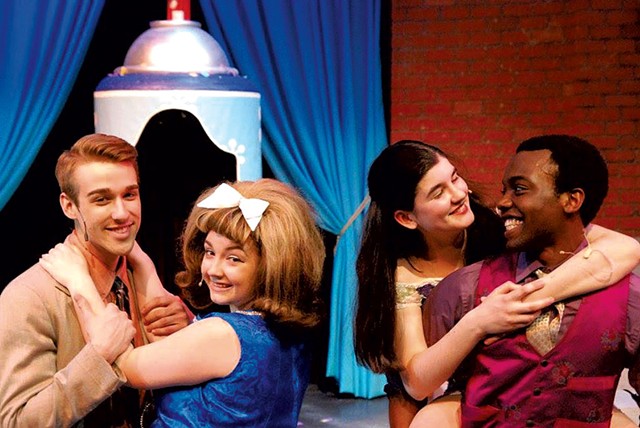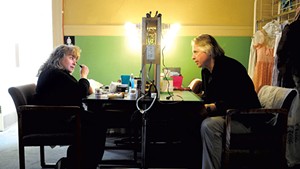
- Courtesy Of Jim Lowe
- Left to right: Pat Moran, Lauren DePuy, Libby Belitsos, Leon Evans
If musicals are all about feeling good, Hairspray is a double-dip cone with sprinkles on top. It combines dance-in-your-seat music, a message of racial equality and a story about accepting yourself. The Lost Nation Theater production is an irresistible flood of good cheer. The company has assembled the largest cast in its 28-year production history, rounding up 27 talented kids and adults to dance, sing and display nearly every hairstyle of the early 1960s.
Hairspray is equal parts inspiration and entertainment. It includes two love stories, a social protest, a nasty villain, a woman who needs to accept her appearance, a teen who already accepts hers, and more than a dozen high school kids who learn how not to judge others by their race or looks. Stitching these plotlines together is the ever-optimistic Tracy, an overweight girl with a best friend, loving parents and crazy hopes of joining the cast of clean-cut kids on "The Corny Collins Show" — a televised after-school dance party akin to "American Bandstand."
Set in Baltimore in 1962, the musical is based on John Waters' 1988 movie and embeds some subversive messages in its bouncy tunes and upbeat story. Tracy's mother, Edna, is played in drag; the kids disobey their parents and even land in jail. But every time they break a rule, they do it in the name of love, racial harmony or both.
"The Corny Collins Show" features white kids dancing with joy but restraint to the latest white pop music. Once a month, though, the show announces that it's "Negro Day" and plays far more popular R&B. When Tracy is tossed into school detention for the rule-breaking height of her teased hair, the ostracized black kids give her dance lessons. It's love at first shimmy. Why, she wonders, is Negro Day only once a month? Why can't black kids appear on the show?
Tracy dreams big and convinces others to join her integration scheme, but Hairspray isn't a fairy tale. The kids initially fail, and the real message concerns how hard it is to keep trying. That idea sparks the show's rallying number, "I Know Where I've Been," sung by a marginalized black DJ and her kids and friends.
Tracy's quest still leaves time for falling in love with the coolest boy in the TV cast, infuriating his shallow girlfriend and her take-no-prisoners stage mother. And Tracy's white best friend, Penny, falls for Seaweed, a black kid with great dance moves.
The musical premiered on Broadway in 2002, with music by Marc Shaiman and lyrics by Scott Wittman and Shaiman. It won eight Tony Awards, including one for best musical. The music is instantly familiar without being derivative, a true homage to the ballads, early rock and silky harmonies of the era.
Lost Nation's 150-seat theater and relatively small performance space make a big musical like Hairspray far from an obvious choice, but director Kathleen Keenan and choreographer Taryn Noelle work wonders. The musical numbers come off as big-time blockbusters, even when the cast must spill into the aisles.
Noelle's choreography draws on '60s dance styles with originality; she doesn't take us to the museum of pre-Beatles dance steps but chooses the moves that get our toes tapping. Noelle provides the lifts, dips and fast-moving formations that make a musical great. Performing everything from cool shuffles to exuberant kicks, the cast bursts with dance-all-night energy.
Keenan's staging is clever and satisfying. She and scenic designer Wally Eastland establish six fully realized locations while making a virtue of the intimate space. Keenan sets a pace that lets the passions in the story drive the action and brings out the high spirits of the performers.
Under music director Nick Bombicino, a five-piece band, nestled on the balcony behind the actors, delivers rousing accompaniment. Performing the score on keyboard, trumpet, sax, bass and drums, the band makes us wish we never had to leave 1962.
The cast blends Lost Nation veterans, local students and out-of-town newcomers. There really aren't any weak links, despite the production's need for a platoon of performers.
Lauren DePuy is delightful as Tracy. She has such a wide smile, her face looks made for the flip hairdo she wears. Her openhearted energy is a joy to watch.
As her beau, Link, Pat Moran has the dreamy, half-closed eyes of a heartthrob and, true to the role, knows how to show prom-king self-confidence.
G. Richard Ames plays good-guy Corny Collins with a wonderful showboating style that truly belongs on TV. Shawn Sturdevant dons wig and housecoat to play Tracy's mom; he pulls off drag with aplomb, in addition to nailing his dance steps in heels.
Amber, the spurned girlfriend, is caught in the crosscurrents of spite and her goody-goody persona. Hannah Brown plays her with delicious nuance. As her mother, Velma, Noelle belts out a revenge plan with brutal glee, capping her song with a gravity-defying backbend.
As Penny, Libby Belitsos is all awkward knees and elbows until she learns some smooth moves and confidence from Seaweed. Leon Evans plays that character with inspiring exuberance. He shows just how high dancing can raise the human spirit.
The production standards for the show are top-notch, especially the panoply of costumes by Cora Fauser and Sally DeCicco.
The production is nonstop fun from the opening number to the curtain call. The pop songs are cheesy because the world once demanded cheesy pop songs. They really don't have an expiration date. With a finale about how the world keeps changing, the show looks backward to remind us how to look forward. Its closing message is perfectly titled "You Can't Stop the Beat," and it's just the tune to hum on your way home.










Comments
Comments are closed.
From 2014-2020, Seven Days allowed readers to comment on all stories posted on our website. While we've appreciated the suggestions and insights, right now Seven Days is prioritizing our core mission — producing high-quality, responsible local journalism — over moderating online debates between readers.
To criticize, correct or praise our reporting, please send us a letter to the editor or send us a tip. We’ll check it out and report the results.
Online comments may return when we have better tech tools for managing them. Thanks for reading.